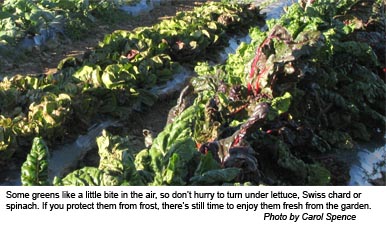Don't Write Off Garden Veggies Yet
Don't Write Off Garden Veggies Yet

The frost may be on the pumpkin, but with a few precautions there’s still time to enjoy the benefits of the garden well into fall and early winter.
Plenty of fruits and vegetables enjoy a bit of a bite – in the air, that is. Cold weather crops such as broccoli, cauliflower, lettuce, Swiss chard and spinach will still do fine after a light freeze. For most plants, it isn’t the temperature that is a problem at this time of year, but the frost itself. When the ice crystals form inside the plant cells they rupture the cell membranes, producing the characteristic frozen water soaked appearance. So protecting frost-sensitive plants by covering the plants with a light blanket or plastic sheeting can extend the harvest for several more weeks.
“You don’t have to keep those plants at 60 degrees,” said John Strang, University of Kentucky Cooperative Extension horticulture professor. “You just have to keep them above freezing. So if you have a blanket over top of the crop, weighted down on the edges, you’ve got thermal radiation coming off the soil that keeps the temperature just above freezing.”
Pumpkins, winter squash and sweet potatoes should have been harvested already, as frost and low temperatures are detrimental to their survival. But once off the vine, curing the vegetables for 10 days at room temperatures will help them keep longer. Curing allows them to heal any wounds, such as a knick from pruning shears or a bruise from handling. Warmer inside temperatures will heal the wounds so microbes won’t infiltrate and cause them to rot. After curing, storage in a fairly dry basement at a temperature of 55 to 60 degrees will allow these vegetables to store for many weeks.
“You need to keep in mind that fruits and vegetables are alive,” Strang said.
Once they’re removed from the mother plant, they no longer have the process of photosynthesis feeding them, so they survive on their reserves of carbohydrates – the starches and sugars contained within the fruit or vegetable.
“It’s kind of like if you skipped dinner for two weeks. What are you going to survive on?” he said.
Because the vegetables are alive, they are actually undergoing respiration, Strang said. Respiration is the process by which carbohydrates are broken down to provide energy, releasing carbon dioxide and water. And there are differences in respiration rates.
Some things, such as asparagus, have a fast respiration rate, whereas onions and potatoes have a slower rate. Left at room temperature, the asparagus will not be worth eating in a few days, but the potatoes and onions will last much longer.
Because of the difference in respiration rate, some varieties will last longer than others. Acorn squash will store for a month or two before it burns up its carbohydrates and becomes stringy. A storage squash called Grey Ghost will store until spring under the right conditions.
Then there are crops that can be stored right in the garden. Carrots will last until the ground freezes. In fact, the cold weather may actually make them a bit sweeter. Strang said that as long as there isn’t a deep freeze in Kentucky, potatoes can often be left in the ground for most of the winter. Sweet potatoes, on the other hand, should be dug up before a hard freeze. If the end of a sweet potato freezes, it can’t seal itself off from microbes and it usually rots. However, Strang said, if you cut the frozen part off and leave the potato at room temperature, the plant will seal and store.
“There’s an old wives’ tale that frozen sweet potatoes are poisonous,” he said. “They’re not poisonous. They just don’t store.”
